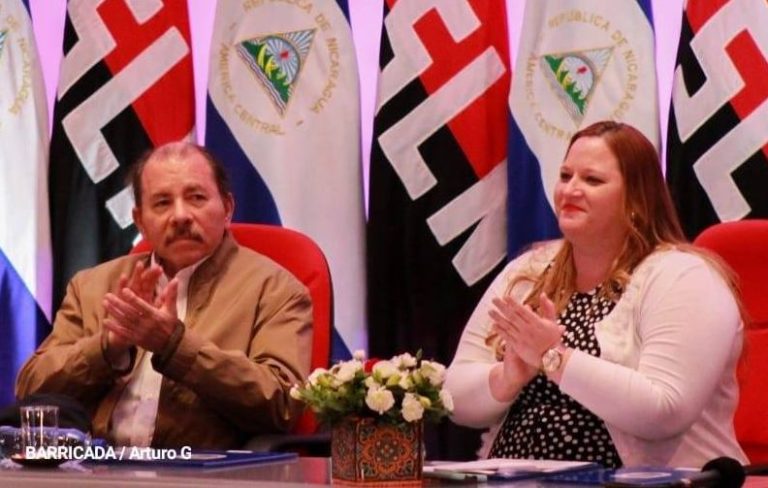7 de febrero 2020

Children of Exile: The Births “Sowing Hope” in the Camp of Nicaraguan Farmers

PUBLICIDAD 1M
PUBLICIDAD 4D
PUBLICIDAD 5D
New regulations from the Interior Ministry to prevent “terrorism” threaten efforts for civic promotion of democratic rights

A new regulation from the Interior Ministry (Ministerio de Gobernacion or Mingob), issued without the required public notice, is the Ortega regime’s latest instrument to exercise political control over the non-governmental organizations, or NGOs. The regulation tacitly forbids them to intervene in the promotion of human rights and democracy, under the supposed guise of a superior interest in the fight against terrorism and money laundering in Nicaragua.
The contents of the regulation that entered into effect in April of 2019 were kept under wraps until December of that same year. This denied the affected organizations their lawful opportunity to file an appeal before the Supreme Court. Now, some NGOs have been fined and given a citation by the Ministry for incompliance with a practically unknown pronouncement.
The regulation’s “objective”, according to the formal rationale, is to “prevent money laundering and the financing of terrorism through the improper use of non-profit organizations”. Nonetheless, Jorge Mendoza, legal advisor for the Pro-Children’s Coordinator (Codeni), affirmed that it’s really “a clear mechanism for political control over the organizations of civil society,” and in addition has the objective of capturing funds.
According to article 30, item number 7, of the “Regulation of the Department for the Registry and Control of Associations for the Supervision and Control of Non-Profit Organizations”, if an NGO “intervenes in matters of a partisan political character in the country”, that constitutes a reason to take over the NGO. If it’s determined that Mingob should intervene in an NGO, the Ministry will automatically name a provisional board of directors to decide the fate of said organization.
“It establishes requirements that weren’t previously established in Law #147, the General Law Regarding Non-Profit Status, going beyond the prerogatives and authority of the office in charge of controlling the non-profit associations,” declared Mendoza.
A source that asked to remain anonymous told Confidencial that the Ministry regulation aspires to “absolute control” of civil society, “so that no one opposes [the regime]. They’re afraid that these NGOs will continue opening the minds of the citizenry.”
Another concern regarding this regulation “is the warning” they’re giving to the legal representatives of the NGOs who “must sign a formal commitment in the department of registry and control of associations, assuming the clear and precise obligation of not including in their projects any programs or actions of a partisan political nature.”
To Mendoza, such a commitment “is going to mean that if we [the NGOs] want to develop any programs for civic education regarding how each vote counts in the elections, or anything like that, with an eye to this being a pre-election year, they [Mingob] are going to classify this as political proselytizing.”
In addition, this regulation “establishes some abusive intervention mechanisms,” Mendoza assured. “Now, the denunciation of one member of an NGO who claims they suspect irregularities in the direction and administration, can lead the Interior Ministry to intervene in your organization,” he emphasized.
Beyond the intent to silence the voices of the NGOs, the anonymous source felt that the regime has an economic interest: “What they want is to control foreign cooperation monies, so that the tiny amount of aid that still exists doesn’t go to those organizations, but to the Government,” the source asserted.
In the same way, Mendoza estimated that there’s “a fundraising interest” behind the Ministry regulation. He noted that now all of the wage reports and letters of fulfillment must be submitted every three months, when before it was done once a year.
This isn’t the first of the regime’s assaults against the NGOs. In December 2018, they stripped nine organizations of their legal non-profit status, in addition to confiscating their property. The confiscated organizations were: The Nicaraguan Human Rights Center (Cenidh), the Institute for Strategic Studies and Public Policies (Ieepp), Let’s Make Democracy, the Center for Information and Health Advisory Services (Cisas), the Center for Communications Investigation (Cinco), the Institute for Development and Democracy (Ipade), Popul Na, The River Foundation, and the Leadership Institute in the Segovias.
Archivado como:
PUBLICIDAD 3M
Confidencial es un diario digital nicaragüense, de formato multimedia, fundado por Carlos F. Chamorro en junio de 1996.
PUBLICIDAD 3D